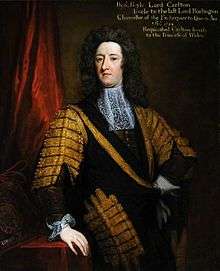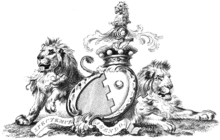Henry Boyle, 1st Baron Carleton
Henry Boyle, 1st Baron Carleton, PC (12 July 1669 – 31 March 1725) was an Anglo-Irish Whig politician who sat in the Irish House of Commons from 1692 to 1695 and in the English and British House of Commons between 1689 and 1710. He served as Chancellor of the Exchequer and Secretary of State, and after he was raised to the peerage as Baron Carleton, served as Lord President of the Council.
The Lord Carleton | |
|---|---|
 | |
| Lord President of the Council | |
| In office 25 June 1721 – 27 March 1725 | |
| Monarch | George I |
| Preceded by | Viscount Townshend |
| Succeeded by | The Duke of Devonshire |
| Personal details | |
| Born | 12 July 1669 |
| Died | 31 March 1725 (aged 55) |
| Education | Westminster School |
| Alma mater | Trinity College, Cambridge |
Biography
Boyle was the son of Charles Boyle, 3rd Viscount Dungarvan and his first wife Lady Jane Seymour, daughter of William Seymour. He was educated at Westminster School and travelled abroad from 1685 to 1688, attending Padua University in 1685.[1] He entered the army under the auspices of his uncle, the Tory politician Lord Rochester. However, Boyle himself became a Whig, and in 1688 deserted the army of James II in favour of the Prince of Orange.

In 1689, he was elected Member of Parliament for Tamworth, but was defeated the next year.[2] He spent the next two years in Ireland managing the family estates and represented Cork County in the Irish House of Commons in 1692. Also in 1692, he was returned as MP for Cambridge University at a by election on 21 November 1692, having been admitted at Trinity College, Cambridge on 9 November, and was awarded MA in 1693.[3] He became a prominent spokesman of the "country" opposition, but in 1697 he switched to the court party. Here he advanced quickly, becoming a Lord of the Treasury in 1699 and Chancellor of the Exchequer of England in 1701.[1]
Boyle picked up other offices during his career, becoming Lord Lieutenant of the West Riding of Yorkshire and Lord Treasurer of Ireland in 1704, and was elected member for Westminster at the 1705 English general election. With the departure of Harley and his followers from the government, Boyle became Secretary of State for the Northern Department and Lord Treasurer Godolphin's principal lieutenant in the Commons. His and Godolphin's dominance in the ministry was increasingly overshadowed by the power of the Junto of Whig aristocrats, however, and in 1710 he retired from office and withdrew from politics with the arrival of Harley's new Tory ministry.
Baron Carleton
With the Hanoverian succession in 1714, Boyle was raised to the peerage as Baron Carleton, and became Lord President in 1721, an office in which he continued until his death in 1725.
Carlton Way, a road in north Cambridge that follows the path of the Roman Akeman Street, and the public house The Carlton Arms on the same road, are named after him.[4]
References
- "BOYLE, Hon. Henry (1669-1725), of Carleton House, Pall Mall, Westminster". History of Parliament Online (1690-1715). Retrieved 21 August 2019.
- "BOYLE, Hon. Henry (d.1725), of Pall Mall, Westminster". History of Parliament Online (1660-1690). Retrieved 21 August 2019.
- "Boyle, the Hon. Henry (BL692-)". A Cambridge Alumni Database. University of Cambridge.
- Gray, Ronald D; Stubbings, Derek (2000). Cambridge Street-Names: Their Origins and Associations. Cambridge: Cambridge University Press. pp. 2–3.
| Parliament of Ireland | ||
|---|---|---|
| Preceded by Unknown |
Member of Parliament for Cork County 1692–1695 With: St John Brodrick |
Succeeded by Sir St John Brodrick Thomas Brodrick |
| Parliament of England | ||
| Preceded by Sir Robert Sawyer Edward Finch |
Member of Parliament for Cambridge University 1692–1705 With: Edward Finch 1692–1695 George Oxenden 1695–1689 Anthony Hammond 1698–1701 Isaac Newton 1701–1702 Arthur Annesley 1702–1705 |
Succeeded by Arthur Annesley Dixie Windsor |
| Preceded by Sir Walter Clarges, Bt Sir Thomas Crosse |
Member of Parliament for Westminster 1705 – 1707 With: Sir Henry Dutton Colt, Bt |
Succeeded by Parliament of Great Britain |
| Parliament of Great Britain | ||
| Preceded by Parliament of England |
Member of Parliament for Westminster 1707 – 1710 With: Sir Henry Dutton Colt, Bt 1707–1708 Thomas Medlycott 1708–1710 |
Succeeded by Thomas Medlycott Sir Thomas Crosse |
| Political offices | ||
| Preceded by The 2nd Earl of Burlington |
Lord Treasurer of Ireland 1704–1715 |
Succeeded by The 3rd Earl of Burlington |
| Preceded by John Smith |
Chancellor of the Exchequer 1701–1708 |
Succeeded by John Smith |
| Preceded by Robert Harley |
Northern Secretary 1708–1710 |
Succeeded by Henry St John |
| Preceded by The Viscount Townshend |
Lord President of the Council 1721–1725 |
Succeeded by The Duke of Devonshire |
| Honorary titles | ||
| Preceded by The 2nd Earl of Burlington |
Lord Lieutenant of the West Riding of Yorkshire 1704–1715 |
Succeeded by The 3rd Earl of Burlington |
| Vice-Admiral of Yorkshire 1704–1715 | ||
| Custos Rotulorum of the North Riding of Yorkshire 1704–1715 | ||
| Peerage of Great Britain | ||
| New creation | Baron Carleton 1714–1725 |
Extinct |
.svg.png)
.svg.png)

.jpg)